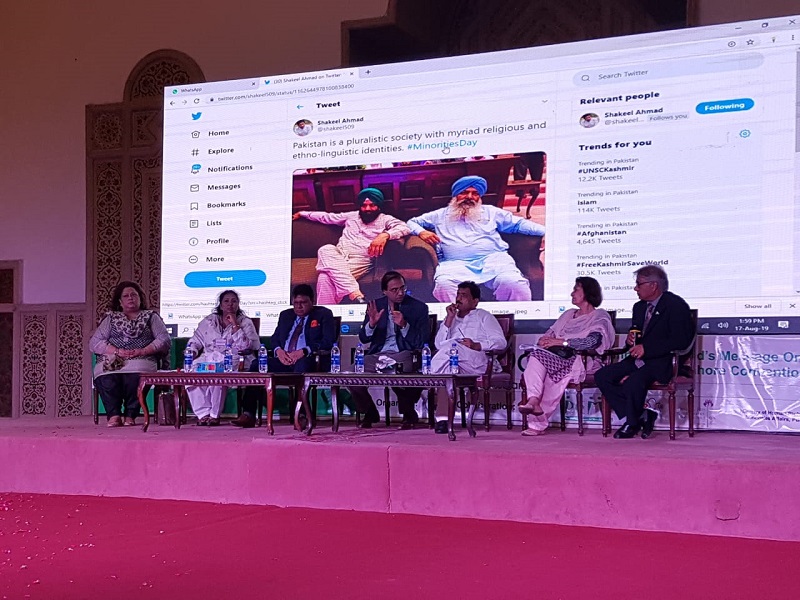LAHORE, Pakistan: The Centre for Social Justice (CSJ) and the Ministry for Human Rights and Minorities Affairs in collaboration with the Ajoka Theatre, the National Commission for Justice and Peace (NCJP), the People’s Commission for Minorities Rights (PCMR), and Cecil & Iris Chaudhry Foundation (CICF) and organized a Convention to mark National Minorities Day at Aiwan-e-Iqbal in Lahore on Saturday.
The Minorities Day Convention marked the 72nd anniversary of Quaid-e-Azam Muhammad Ali Jinnah’s famous speech delivered before Constituent Assembly of Pakistan on August 11, 1947 that guaranteed the equality of rights and freedom for all Pakistanis.
Minister Ijaz Alam Augustine was the chief guest of the Convention, while Maulana Abdul Khabeer Azad (Grand Imaam of Badshaahi Mosque) Peter Jacob, Justice (retd) Nasir Javed Iqbal, PMA Tariq Gill, Saroop Ijaz Advocate, Dr. Kalyan Singh, Dr. Rubina Feroze Bhatti, Shahid Nadeem and Michelle Chaudhry were among the speakers. Dr. Fr. Bonnie Mendes, Fr. Raphael Mehnga, Cecil Shane Chaudhry and other dignitaries were also present.
Speaking on the occasion, the provincial Minister for Human Rights & Religious Affairs, Ijaz Alam Augustine said that government is firmly committed to actualizing the vision of the Jinnah, with regard to protection of religious minorities and the ministry for Human Rights & Minorities Affairs devoted to take exemplary steps to eliminate hate material from textbooks, and protect and preserve religious sites of minority communities, and ensure implementation of job quota, and remission in imprisonment.
The CSJ Executive Director and the Chairperson of the Peoples Commission for Minorities’ Rights (PCMR) Peter Jacob said, “The government should make it a policy priority to strengthen institutional protection of minority rights by undertaking a series of legal, policy and administrative measures to accommodate, and cater to the demands, needs & challenges of minority communities in Pakistan”.
Maulana Abdul Khabeer Azad said, “Minorities are entitled to equal human rights that every Pakistani enjoys. The implementation and protection of human rights in general and rights of marginalized groups is the prime responsibility of the state.”
Saroop Ijaz said, “It is disastrous to run the matters of the state on the basis of religion rather than citizenship and human rights as we have witnessed in Kashmir. If Pakistan want to see India change its attitude towards minorities, then the government of Pakistan must set example by ensuring equality of rights among Pakistani citizens.”
Justice (retd) Nasira Javed Iqbal said that the Quaid-e-Azam laid down the foundations of a nation where all Pakistani irrespective of any discrimination could enjoy equality of rights, and serve to promote tolerance and build a prosperous society. She demanded that establishment of commission for minority rights is imperative to address issues that minorities face.
Shahid Nadeem said that performing arts is a medium to eliminate prejudice, and inculcate positivity in hearts, and Ajoka Theatre is making utmost efforts to contribute to build a society where there is equality in rights and opportunities for all.
The Convention opened with national anthem followed by religious music of Pakistan to acknowledge and respect religious diversity. The artists and musicians from different background performed hymn, Qawali, and Bhajan, while team of Ajoka Theatre gave a stellar performance on “Bullah tay banda” that depicted the life experiences and lessons of Sufi saint Bulleh Shah (1680–1757) with the aim of fostering a culture of inter-faith and inter-communal harmony and respect for human dignity irrespective of race, religion or ethnicity.
